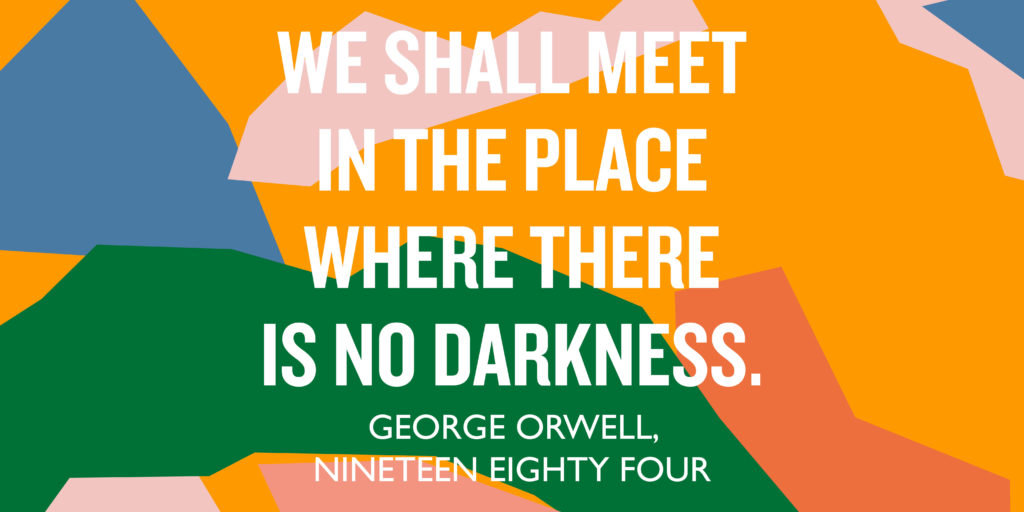
In the time that the Orwell Youth Prize has been open for entries, thinking about ‘The Future We Want’ has taken on a different significance. Everyone’s world has shifted immeasurably over the last few weeks, and it feels easy to say that the future we want is the past we just had.
Now more than ever, we need the courage to imagine, and the creativity that difficult times bring. We have a big new global challenge, but one that has brought into relief many problems that were already with us: our relationship to the environment, our experience of education and healthcare, the way our government and media communicate, our connection to our communities.
What does the future look like now? What does it mean to write about a future we want? Who’s thinking about the future while we’re all thinking about the present?
Resources for Now
As things shift and change, alongside our existing resources, we’ll be pulling together reading and listening recommendations that may provide hope, comfort, new ideas or thoughtful commentary in this unprecedented period.
At the Orwell Youth Prize, we aim to cover a wide range of perspectives and interpretations from across the political spectrum, if you disagree with an argument made in any of our resources, think about why and how you would counter it, consider language, political bias and the overall aim of the piece.
Orwell for Now
George Orwell lived through tumultuous times. He also went out of his way to be a part of history, volunteering as a soldier during the Spanish Civil War and working for the BBC during the Second World War creating programmes for broadcast in India, which was then part of the British Empire. Orwell’s method – making sure he saw with his own eyes, and forever questioning his own assumptions – meant that he often changed his mind, though he was never shy of arguing for what he believed. Through his fiction, journalism and essay, he was constantly exploring what it means to tell the truth in an uncertain world. Across the Foundation website you can find examples of how his writing can be a source of inspiration now.
The current crisis means we cannot go out and find the story like Orwell did: the story has come to us. But Orwell’s method is just as important. His writing is an example of how there is strength to be found in embracing, and interrogating, change. Our present might at times feel like the lonely, limiting future which Orwell imagined in Nineteen Eighty-Four. However, it is worth remembering that Orwell’s present is our past. Orwell was writing when the United Kingdom was reeling from the Second World War, the communist Soviet Union was a world power, everyday life was very different to how it is today. Orwell described Nineteen Eighty-Four as a warning, not a prophecy. What warning would you give to the future?
‘It is impossible to found a civilization on fear and hatred and cruelty. It would never endure… It would have no vitality. It would disintegrate. It would commit suicide.’ Nineteen Eighty-Four
‘Every February since 1940 I have found myself thinking that this time Winter is going to be permanent… At any rate, spring is here, even in London, and they can’t stop you enjoying it.’ ‘Some Thoughts on The Common Toad‘ (1946)
‘The actual differences in social atmosphere and political behaviour between country and country are far greater than can be explained by any theory which writes off laws, customs, traditions, etc. as mere ‘superstructure.’ ‘Fascism and Democracy’ (1941)
Coronavirus & The Future
In the short run we are all infected – Liam Stanley (London Review of Books Blog)
The Seven Early Lessons of Coronavirus – Ivan Krastev (New Statesman)
Outlook Podcast (BBC World Service)
Politics
Nationalism is a side effect of coronavirus – Gideon Rachman (Financial Times, Orwell Prize Winner) – See if your school has signed up to free Financial Times subscription here – or request a free account )
How coronavirus is remaking democratic politics – Philip Stephens (Financial Times). See if your school has signed up to free Financial Times subscription here – or request a free account )
The Coronation – Charles Eisenstein
Consequences
How Power Profits From Disaster – Naomi Klein (Guardian)
Virus lays bare the frailty of the social contract – Editorial Board (The Financial Times) See if your school has signed up to free Financial Times subscription here – or request a free account )
The Media
How you can fact check claims about the new coronavirus
What makes us believe a false claim? Age, education and cognitive biases all play a part
Work
Youth
It’s time for an NHS National Service – Aris Rossinos
Race
BAME People Are More Likely To Die Of Coronavirus Than White People, Arj Singh (Huffington Post)
Environment
After Covid-19, The Climate – Anne Orford (London Review of Books Blog)
Listening: Short Cuts – Habitat – Josie Long (BBC)
A Message From the Future With Alexandria Ocasio-Cortez
Culture & Writing
What our contagion fables are really about – Jill Lepore (The New Yorker)
‘Poetry can be the bridge that connects us during these difficult times’ – Mary Jean Chan (Guardian)
Feeling overwhelmed? How art can help in an emergency – Olivia Laing (Guardian)
Winter in the Abruzzi – Natalia Ginzberg
Healthcare
Housing
The idea of sharing a home across generational divides is having a come back – Fatima Hudoon (The Bristol Cable)
Community
This Changes Everything, Neal Lawson (Rethinking Poverty – The Webb Legacy)
WRITING ADVICE
The brilliant work of previous winners of the Orwell Youth Prize
If you have any further questions, suggestions, or thoughts, please get in touch with Alex Talbott, alextalbott@orwellyouthprize.co.uk